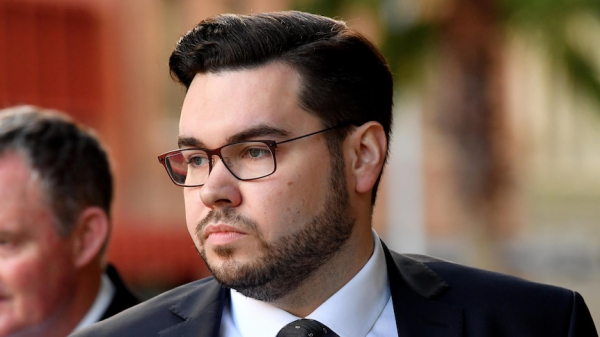Unraveling the Repercussions: Assessing the Impact of Fresh Evidence on Bruce Lehrmann's Defamation Trial
The resurgence of the defamation lawsuit between Bruce Lehrmann and Network Ten has sparked widespread intrigue this week, drawing the attention of numerous onlookers. With the emergence of a new witness and the introduction of several fresh exhibits, the courtroom drama has intensified. Yet, amidst the fervor, the pivotal question lingers: has this influx of new information altered the trajectory of the case? Opinions diverge sharply.
A notable aspect of this legal spectacle is the unprecedented scrutiny directed towards a television network not directly involved in the litigation. Reports suggest that senior figures at Seven Network have been scrambling to contain the fallout following this week's revelations. However, interpretations vary widely regarding the significance of these developments in relation to Mr. Lehrmann's contention that he was defamed during the interview with Brittany Higgins on The Project.
Utilizing the new evidence, Network Ten has launched a vigorous assault on Mr. Lehrmann's credibility, casting doubt on his testimony as one of the pivotal witnesses alongside Ms. Higgins. Mr. Lehrmann steadfastly denies the accusation of rape leveled against him by his former colleague. Following a mistrial in the ACT Supreme Court, no formal findings have been made against him. Despite this, Ten has resurrected the case, enlisting former Seven producer Taylor Auerbach in an attempt to demonstrate Mr. Lehrmann's alleged falsehoods and malice, potentially diminishing any damages he might claim.
During the proceedings, Ten's barrister, Matthew Collins, contended that the only plausible inference regarding Seven's access to material from Mr. Lehrmann's criminal case was that he himself provided it, in contravention of court regulations. In his testimony, Mr. Lehrmann maintained that he merely granted an interview to the program. Collins emphasized that this purported conduct strikes at the heart of Mr. Lehrmann's integrity and respect for judicial processes.
However, it was the bombshell revelation surrounding Seven Network's alleged reimbursement of Mr. Lehrmann for illicit substances and services that captured the public's imagination. Once again, this evidence was marshaled by Ten to challenge Mr. Lehrmann's prior assertions. Contrary to his claims last year, wherein he stated that he received only a year's worth of rent, totaling over $100,000, for his interview, these new revelations paint a different picture.
Mr. Lehrmann's legal team staunchly opposed the reopening of the case from the outset. During his closing arguments, his barrister, Matthew Richardson, asserted that little had fundamentally shifted throughout the week-long proceedings. "The application has not moved the dial on the evidentiary issues, nor the assessment of damages," Richardson declared.
As the trial nears its conclusion, the implications of the fresh evidence remain uncertain. The courtroom saga continues to captivate observers, underscoring the intricacies and complexities inherent in the pursuit of justice.
Unveiling the Veracity: Scrutinizing Witness Credibility in Bruce Lehrmann's Defamation Trial
Mr. Richardson launched a direct assault on Mr. Auerbach's credibility as a witness, persisting in his line of argument even after Mr. Auerbach presented an invoice purportedly demonstrating Seven's reimbursement of Mr. Lehrmann for his activities in January last year. Despite the invoice listing a $750 item for "pre-production expenses," Mr. Richardson contended that this amount paled in comparison to the expenses Mr. Lehrmann allegedly incurred while purchasing drugs and engaging with sex workers. "Even the least experienced individual in this room, sadly perhaps myself, would recognize that this is a stretch," he remarked.
Despite characterizing his client's overall evidence as "unsatisfactory" in various respects, Mr. Richardson cautioned against reading too much into the developments of the week. "There is no inherent connection between my client's denials and falsehoods about material facts," he asserted.
Approaching nearly a year since Bruce Lehrmann was granted permission to proceed with his lawsuit, Justice Michael Lee has borne witness to extensive mud-slinging regarding the credibility of both Mr. Lehrmann and Ms. Higgins. "Both parties have vigorously argued that the principal witnesses are untruthful," remarked Justice Lee. "While such submissions are pertinent, they only carry limited weight.
The judge's remarks suggest that Network Ten's arguments this week may not have substantially altered the assessment he must undertake. Nevertheless, Justice Lee reiterated his commitment to deliberating carefully, acknowledging the shared desire for a prompt resolution. "There is a mutual interest in expediting this matter," concluded Justice Lee, signaling the culmination of the proceedings.
In conclusion, as Bruce Lehrmann's defamation trial draws to a close, the courtroom saga has been characterized by intense scrutiny, vigorous debate, and a relentless focus on witness credibility. Despite the emergence of fresh evidence and heated exchanges between legal teams, the fundamental questions surrounding the case remain unresolved. Justice Michael Lee's observations underscore the complexity of the matter, highlighting the limitations of relying solely on assertions of witness dishonesty. As deliberations continue, it becomes increasingly evident that the ultimate decision rests on a careful examination of the facts presented. While the desire for a swift resolution persists, the importance of thorough consideration cannot be overstated. In the quest for justice, it is imperative that all aspects of the case are meticulously evaluated, ensuring a fair and just outcome for all parties involved.

